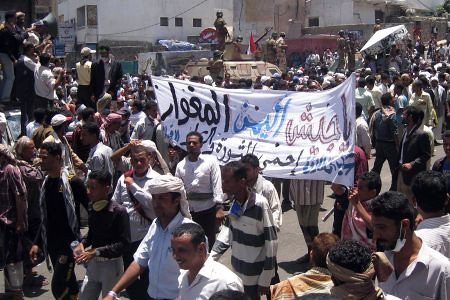
Thousands have demonstrated daily in the Arab nation of Yemen against the US-backed government of President Saleh. The uprising in Yemen has been downplayed by the corporate media in the U.S. and other western states., a photo by Pan-African News Wire File Photos on Flickr.
Yemenis vote as Saleh's 33-year rule ends
AFP | Feb 21, 2012, 09.45AM IST
Yemeni voters head for the polls today, ending President Ali Abdullah Saleh's 33-year rule and thus making Yemen the first Arab state where a revolt has led to a negotiated settlement.
The referendum-like poll, in which Saleh's deputy Abdrabuh Mansur Hadi is standing as the sole consensus candidate, is being boycotted by two major opposition groups; the separatist Southern Movement and the northern Shiite rebels.
But the main proponents of the uprising that began in January 2011 have asked Yemenis to throw their support behind Hadi, whose posters have been plastered across buildings and throughout the streets of the capital Sanaa.
Hardline factions of the Southern Movement have gone as far as calling for preventing the election from taking place at all, and making Tuesday a day of "civil disobedience" to disrupt voting.
Attacks on polling stations and clashes between troops and anti-election protesters in the south have raised fears that polling day could be marred by violence.
Such fears have prompted authorities to deploy 103,000 soldiers to guard polling stations, said Mohammed Yahya, chairman of the Electoral Commission.
Hadi, himself a southerner, pledged on Sunday to southern separatists and northern rebels that he will address their concerns, saying that "dialogue and only dialogue" can resolve these long-standing conflicts.
Yemen's new president will rule for an interim two-year period, after which presidential and parliamentary elections will be held, a condition of the Gulf-brokered transition deal signed by Saleh in November.
However Saleh's shadow looms large over today's vote. The veteran strongman maintains a strong hold over the most powerful security forces and there is also speculation that he might return from the United States, where he is receiving medical treatment, as soon as Wednesday.
In a speech published on state news agency Saba yesterday, Saleh, spared the fates of his ousted Arab counterparts, urged Yemenis to vote for his deputy to ensure a "peaceful" transition of power.
Autocrats in Tunisia and Egypt were forced to resign last year, bowing down to mass uprisings.
In Libya, rebels backed by NATO forces captured and killed dictator Muammar Gaddafi in October.
No comments:
Post a Comment